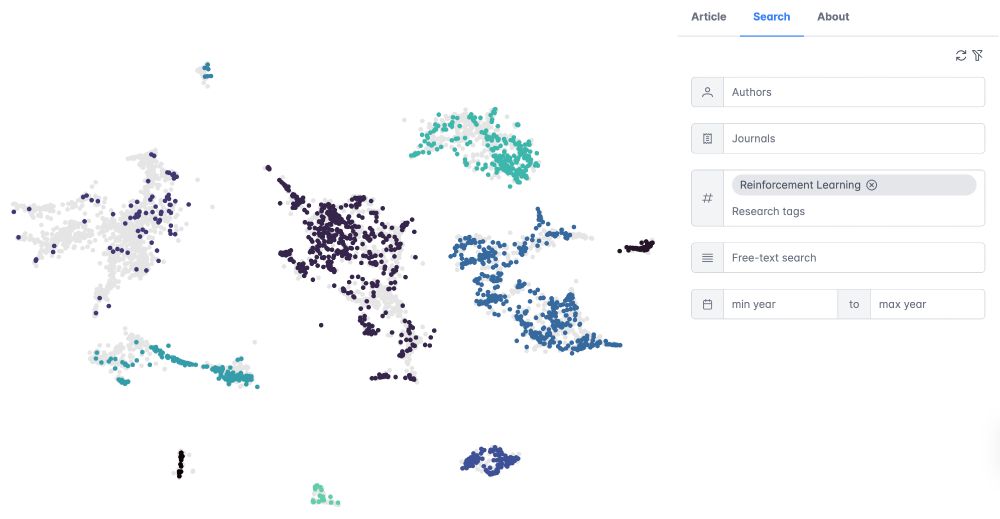
Research director of the Human Reinforcement Learning team
Ecole Normale Supérieure (ENS)
Institut National de la Santé et Recherche Médicale (INSERM)


We aimed to cover all the foundations of the topic in an accessible manner for a large audience.
It could help set up a bachelor-level curriculum on the topic.
Pre-orders are very key for the fate of books: shorturl.at/Dxbif
We aimed to cover all the foundations of the topic in an accessible manner for a large audience.
It could help set up a bachelor-level curriculum on the topic.
Pre-orders are very key for the fate of books: shorturl.at/Dxbif


We aimed to cover all the foundations of the topic in an accessible manner for a large audience.
It could help set up a bachelor-level curriculum on the topic.
Pre-orders are very key for the fate of books: shorturl.at/Dxbif
Pre-order here: shorturl.at/Dxbif

Pre-order here: shorturl.at/Dxbif
We aimed to cover all the foundations of the topic in an accessible manner for a large audience.
It could help set up a bachelor-level curriculum on the topic.
Pre-orders are very key for the fate of books: shorturl.at/Dxbif


We aimed to cover all the foundations of the topic in an accessible manner for a large audience.
It could help set up a bachelor-level curriculum on the topic.
Pre-orders are very key for the fate of books: shorturl.at/Dxbif
osf.io/preprints/ps...
osf.io/preprints/ps...
The introduction (by Jochen Reb, Natalia Karelaia & Tomás Lejarraga )to the "Mind and Society" special issue on "adaptive biases" I had the pleasure to contribute to
link.springer.com/article/10.1...

The introduction (by Jochen Reb, Natalia Karelaia & Tomás Lejarraga )to the "Mind and Society" special issue on "adaptive biases" I had the pleasure to contribute to
link.springer.com/article/10.1...
The introduction (by Jochen Reb, Natalia Karelaia & Tomás Lejarraga )to the "Mind and Society" special issue on "adaptive biases" I had the pleasure to contribute to
link.springer.com/article/10.1...

The introduction (by Jochen Reb, Natalia Karelaia & Tomás Lejarraga )to the "Mind and Society" special issue on "adaptive biases" I had the pleasure to contribute to
link.springer.com/article/10.1...
osf.io/preprints/ps...
osf.io/preprints/ps...
The presentation of Richard Thaler's (Chicago Booth) latest book, followed by a roundtable discussion, organized by the "An integrated approach of economic decisions" project.
www.parisschoolofeconomics.eu/en/events/th...
The presentation of Richard Thaler's (Chicago Booth) latest book, followed by a roundtable discussion, organized by the "An integrated approach of economic decisions" project.
www.parisschoolofeconomics.eu/en/events/th...
The plot’s crux is an illustration of the alignment problem (an all-powerful AI with wildly misaligned goals). Basically, the paperclip maximiser has gone rogue.
(but do not expect great writing and depth of reflection)


The plot’s crux is an illustration of the alignment problem (an all-powerful AI with wildly misaligned goals). Basically, the paperclip maximiser has gone rogue.
(but do not expect great writing and depth of reflection)
Are reinforcement learning models complete accounts of decisions from experience if they ignore explicit memory?
In this new preprint, we show that people indeed form robust explicit memory representations that flexibly guide later decisions.
🔗 Preprint: doi.org/10.1101/2025...

Are reinforcement learning models complete accounts of decisions from experience if they ignore explicit memory?
In this new preprint, we show that people indeed form robust explicit memory representations that flexibly guide later decisions.
🔗 Preprint: doi.org/10.1101/2025...
R.I.P. Sofia Corradi (1934 – 2025), the beautiful mind behind the ERASMUS project, one of the most successful and beloved EU programme.
It has changed the life (and mind) of ~15 million Europeans (including mine).
en.wikipedia.org/wiki/Sofia_C...

R.I.P. Sofia Corradi (1934 – 2025), the beautiful mind behind the ERASMUS project, one of the most successful and beloved EU programme.
It has changed the life (and mind) of ~15 million Europeans (including mine).
en.wikipedia.org/wiki/Sofia_C...
R.I.P. Sofia Corradi (1934 – 2025), the beautiful mind behind the ERASMUS project, one of the most successful and beloved EU programme.
It has changed the life (and mind) of ~15 million Europeans (including mine).
en.wikipedia.org/wiki/Sofia_C...

R.I.P. Sofia Corradi (1934 – 2025), the beautiful mind behind the ERASMUS project, one of the most successful and beloved EU programme.
It has changed the life (and mind) of ~15 million Europeans (including mine).
en.wikipedia.org/wiki/Sofia_C...
I guess the dream job for @birchlse.bsky.social @petergs.bsky.social


I guess the dream job for @birchlse.bsky.social @petergs.bsky.social
www.linkedin.com/posts/stefan...

www.linkedin.com/posts/stefan...
Thrilled to see this article with @ruimata.bsky.social out. We discuss how LLMs can be leveraged to map, clarify, and generate psychological measures and constructs.
Open access article: doi.org/10.1177/0963...

Thrilled to see this article with @ruimata.bsky.social out. We discuss how LLMs can be leveraged to map, clarify, and generate psychological measures and constructs.
Open access article: doi.org/10.1177/0963...
Thrilled to share new work, mapping the 🗺️ landscape of behavioral reinforcement learning using an 🤖 LLM-powered bibliometric approach.
We built an online tool so you can explore the landscape yourself.
Online tool: mpib.berlin/vFVqU
Preprint: osf.io/6c2va_v1

We developed an LLM-powered bibliometric analysis to characterize article clusters, investigate their connections, and examine the distribution of topics across the landscape.
osf.io/6c2va_v1
www.researchgate.net/publication/...
www.researchgate.net/publication/...
www.pnas.org/doi/abs/10.1...

www.pnas.org/doi/abs/10.1...
www.pnas.org/doi/abs/10.1...

www.pnas.org/doi/abs/10.1...
In our review -with @thecharleywu.bsky.social- we argue they may not be as definitive as originally thought.


In our review -with @thecharleywu.bsky.social- we argue they may not be as definitive as originally thought.
experiential learning with Large Language Models".
doi.org/10.31234/osf...
experiential learning with Large Language Models".
doi.org/10.31234/osf...
In our review -with @thecharleywu.bsky.social- we argue they may not be as definitive as originally thought.


In our review -with @thecharleywu.bsky.social- we argue they may not be as definitive as originally thought.

